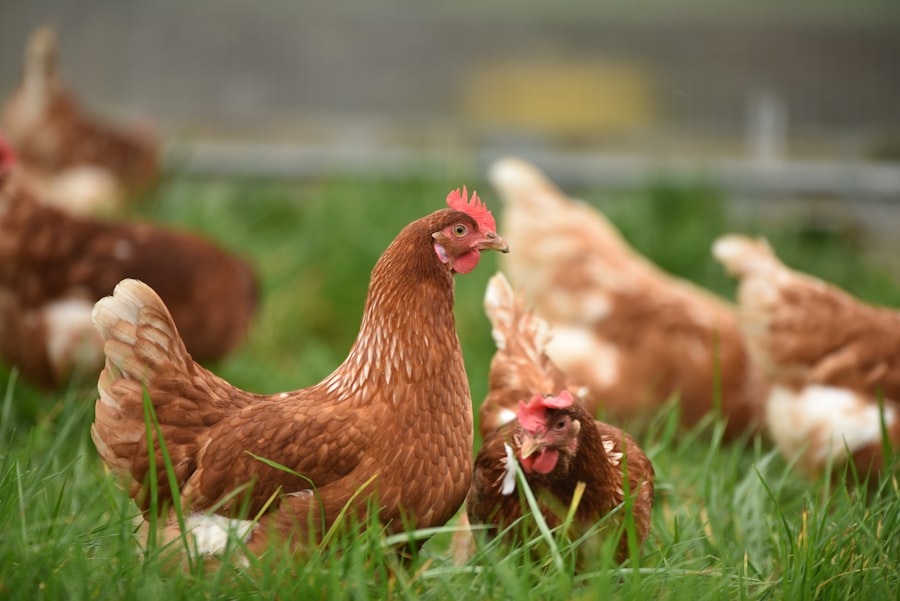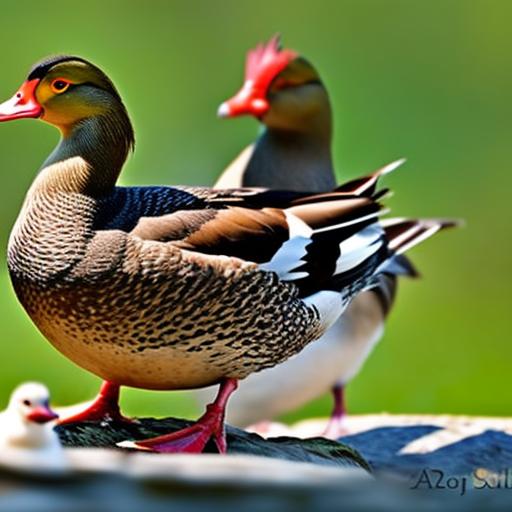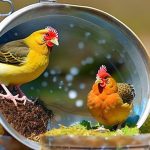Keeping ducks and chickens together in one coop is a topic that has gained popularity among backyard poultry enthusiasts. The idea of having both species in the same space can be appealing for several reasons, such as pest control and increased egg production. However, before embarking on this endeavor, it is important to consider the benefits and considerations of this arrangement.
Key Takeaways
- Ducks and chickens can coexist in the same coop.
- Keeping ducks and chickens together can provide benefits such as pest control and increased egg production.
- Considerations before keeping ducks with chickens include differences in behavior and dietary needs.
- Understanding the differences between ducks and chickens is important for their cohabitation.
- The ideal coop size for ducks and chickens is at least 4 square feet per bird.
Benefits of Keeping Ducks and Chickens Together
One of the main advantages of having both ducks and chickens in one coop is pest control. Ducks are known for their love of insects, slugs, and snails, which can be a nuisance in the garden. By allowing ducks to roam freely with chickens, they can help keep these pests under control, reducing the need for chemical pesticides.
Another benefit is increased egg production. Ducks and chickens have different laying patterns, with ducks typically laying eggs early in the morning while chickens lay throughout the day. By having both species in the same coop, you can potentially have a steady supply of eggs throughout the day.
Personal experiences and anecdotes can help illustrate these benefits. For example, many poultry keepers have reported a decrease in pest populations after introducing ducks to their chicken flock. Additionally, some have noticed an increase in egg production when ducks and chickens are housed together.
Considerations Before Keeping Ducks with Chickens
Before introducing ducks to an existing chicken flock, there are several important factors to consider. One of the most crucial considerations is space. Ducks require more space than chickens due to their larger size and their need for water access. It is important to ensure that there is enough room for both species to move around comfortably.
Temperament is another consideration. Chickens and ducks have different behaviors and social structures. Chickens are generally more aggressive and territorial, while ducks are more docile and social. It is important to observe the dynamics of the existing chicken flock and assess whether they would be accepting of new members.
To prepare for the transition, it is recommended to gradually introduce the ducks to the chicken flock. This can be done by keeping them in separate enclosures within the same area, allowing them to see and interact with each other without direct contact. This gradual introduction helps to minimize stress and aggression between the two species.
Understanding the Differences Between Ducks and Chickens
Understanding the key differences between ducks and chickens is essential for providing proper care for both species. One major difference is their diet. Chickens are primarily grain eaters, while ducks have a more varied diet that includes insects, plants, and aquatic organisms. It is important to provide appropriate feed for each species to ensure they receive the necessary nutrients.
Behavior is another difference to consider. Chickens are ground-dwelling birds, while ducks are more adapted to water. Ducks require access to water for bathing and swimming, which is important for their overall health and well-being. Providing a water source within the coop or nearby is essential for ducks.
The Ideal Coop Size for Ducks and Chickens
When housing a mixed flock of ducks and chickens, it is important to provide an appropriate coop size. As a general guideline, allow at least 4 square feet of floor space per duck and 2 square feet per chicken. This ensures that each bird has enough room to move around comfortably.
To maximize space, consider using vertical space by adding roosting bars or shelves for chickens. Ducks do not typically roost like chickens, so they can utilize the floor space more efficiently. Additionally, ensure that the coop has adequate ventilation to prevent moisture buildup and maintain good air quality.
Designing a Chicken Coop to Accommodate Ducks

If you already have a chicken coop and want to introduce ducks, there are several modifications you can make to accommodate them. One modification is adding a ramp or a gentle slope to allow ducks easy access to the coop. Ducks have a harder time navigating steep ramps or stairs, so providing a gradual incline is important.
Another modification is adding a water source within the coop or nearby. Ducks require water for bathing and swimming, so having a shallow pool or a large water container is essential. Ensure that the water source is easily accessible and can be cleaned regularly to maintain hygiene.
To create separate areas for ducks and chickens within the coop, consider using dividers or partitions. This allows each species to have their own space while still being able to interact with each other. Ducks may also benefit from having a separate nesting area, as they prefer to lay their eggs in secluded spots.
How to Introduce Ducks to an Existing Chicken Flock
Introducing ducks to an existing chicken flock should be done gradually to minimize stress and aggression. Start by keeping the ducks in a separate enclosure within the same area as the chickens. This allows them to see and interact with each other without direct contact.
After a few days, you can begin supervised introductions by allowing the ducks and chickens to interact in a controlled environment. Observe their behavior closely and intervene if any aggression occurs. Gradually increase the duration of these interactions until they can be safely housed together.
It is important to monitor the flock closely during the integration process. If any bird shows signs of distress or aggression, it may be necessary to separate them temporarily and try again at a later time. Patience and careful observation are key during this process.
Feeding and Watering Ducks and Chickens Together
Feeding and watering ducks and chickens together requires some considerations to ensure that each bird gets the proper nutrition and prevent contamination. Ducks require a higher protein diet compared to chickens, so it is important to provide appropriate feed for each species.
One option is to provide separate feeding stations for ducks and chickens. This allows you to control the feed and ensure that each bird gets the appropriate nutrition. Additionally, it helps prevent contamination of the feed by droppings or water.
When it comes to water, ducks require access to water for bathing and swimming. However, chickens do not need as much water for these activities. It is important to provide a separate water source for ducks, such as a shallow pool or a large water container. Ensure that the water is clean and changed regularly to maintain hygiene.
Maintaining a Clean and Healthy Coop for Ducks and Chickens
To maintain a clean and healthy coop for a mixed flock, regular cleaning is essential. Remove droppings and soiled bedding regularly to prevent the buildup of ammonia and reduce the risk of disease. Additionally, provide adequate ventilation to prevent moisture buildup and maintain good air quality.
Pest control is another important aspect of coop maintenance. Ducks can help control pests such as insects, slugs, and snails, but it is still important to monitor for any signs of infestation. Regularly inspect the coop for signs of pests and take appropriate action if necessary.
It is also important to monitor the flock for signs of illness. Ducks and chickens can be susceptible to different diseases, so it is important to be familiar with the common ailments of each species. If any bird shows signs of illness, isolate them from the rest of the flock and seek veterinary advice if necessary.
The Rewards of Keeping Ducks and Chickens Together in One Coop
Keeping ducks and chickens together in one coop can be a rewarding experience for backyard poultry enthusiasts. The benefits include pest control, increased egg production, and the joy of observing the interactions between these two species.
However, it is important to consider the space requirements, temperament differences, and dietary needs of ducks and chickens before introducing them to an existing flock. By understanding these considerations and making appropriate modifications to the coop, you can create a harmonious environment for both species.
If you are considering keeping ducks and chickens together, it is recommended to start with a gradual introduction and closely monitor the flock during the integration process. Providing appropriate feed and water for each species, maintaining a clean and healthy coop, and monitoring for signs of illness are essential for the well-being of the flock.
In conclusion, keeping ducks and chickens together in one coop can be a rewarding and beneficial arrangement. By considering the benefits and considerations outlined in this article, you can create a thriving mixed flock that provides pest control, increased egg production, and a unique backyard experience.
If you’re wondering whether you can keep ducks with your chickens, you might find this article on Poultry Wizard’s website helpful. They discuss the benefits and considerations of housing ducks and chickens together in a large chicken coop. The article provides insights into the compatibility of these two poultry species and offers practical tips for creating a harmonious living environment for them. To learn more, check out the article here.
FAQs
Can I keep ducks with my chickens?
Yes, it is possible to keep ducks with chickens. However, there are some things to consider before doing so.
What are the benefits of keeping ducks with chickens?
Ducks and chickens can coexist peacefully and even provide benefits to each other. Ducks can help control pests like slugs and snails, while chickens can help keep the duck’s water clean by drinking from it.
What are the challenges of keeping ducks with chickens?
Ducks and chickens have different needs and behaviors, which can lead to some challenges. Ducks require more water than chickens and can make a mess with their water. They also tend to be messier eaters and can waste more food than chickens.
What should I consider before keeping ducks with chickens?
Before keeping ducks with chickens, consider the space you have available, the number of birds you want to keep, and the type of housing and fencing you will need. It’s also important to make sure the birds have access to separate food and water sources.
What should I feed my ducks and chickens?
Ducks and chickens have different nutritional needs, so it’s important to provide them with separate feeds. Ducks require a higher protein and fat content in their diet, while chickens require more calcium for egg production.
Can ducks and chickens share the same coop?
While ducks and chickens can share the same coop, it’s important to provide separate nesting boxes and perches. Ducks also require more space than chickens, so make sure the coop is large enough to accommodate both species.
Meet Walter, the feathered-friend fanatic of Florida! Nestled in the sunshine state, Walter struts through life with his feathered companions, clucking his way to happiness. With a coop that’s fancier than a five-star hotel, he’s the Don Juan of the chicken world. When he’s not teaching his hens to do the cha-cha, you’ll find him in a heated debate with his prized rooster, Sir Clucks-a-Lot. Walter’s poultry passion is no yolk; he’s the sunny-side-up guy you never knew you needed in your flock of friends!







